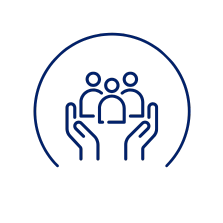Companion App.
Supporting Family Members, Friends, and Caregivers of Individuals with Substance Use Disorder
Companion app is a digital resource for organizations supporting individuals with SUD. It extends your program’s impact by supporting family members, friends, and caregivers with a moderated digital community that offers guidance, shared experiences, and valuable resources for recovery and self-care.


Customizable Home Screen Banners
Tailor the app experience to enhance accessibility and promote local resources for families and companions in your network.

Community Building
Facilitate connections within a robust digital community where companions can support each other, fostering loyalty to your services and enhancing overall client satisfaction.

Comprehensive Resource Library
Equip companions with a rich library of educational content to deepen their understanding of mental health and substance use disorders and find positive ways to manage their emotions.

Daily Inspiration
Motivate and foster positivity through daily reflections, improving resilience and well-being, which supports higher engagement in your treatment and family support programs.
The Investment Value of Family Support
Research shows that loved ones play a pivotal role in improving treatment outcomes by enhancing engagement, reducing substance use, increasing rates of abstinence, and decreasing incidents of arrests and hospitalizations.
Investing in a comprehensive family support program benefits individuals in your care and yields substantial business advantages for your organization. Here’s how:

Substance use disorders and addiction don’t just affect the person using the substances. There’s a great deal of collateral damage to everyone around them.
– Janelle Wesloh, MBA, LADC
Proven Impact.
Interested in supporting family members?
This resource is available to providers, payers, and public sector organizations. Individuals can only access this through a partnering organization. This is not directly available to consumers/ individuals.
Complete the form and we’ll reach out to chat.
